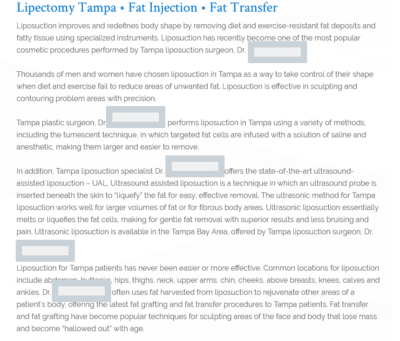When was the last time you reviewed the content of your plastic surgery, dermatology, medspa, or hospital website? Can you recall?
If your organization last revamped its website more than four years ago, you may have a Google problem. Specifically, your website might be riddled with keyword stuffing.
What is keyword stuffing?
As I reference in Chapter One of my free ebook, 7 Deadly Sins of Healthcare Content Writing that Kill SEO and Turn Off Prospective Clients, keyword repetition used to be emphasized in writing web pages because it helped the Googlebot parse what your web page was all about. If you wrote a page about liposuction, your content writer likely repeated that term many times within the copy.
And depending on the length of the page content and the specific usage of the term “liposuction,” that may still serve your site well, in terms of enhancing your search rank on Google. If the page copy was crafted by an expert who used the term naturally and didn’t repeat it too often, then you’re A-OK – as far as Google is concerned.
However, if your web pages were written by people less-skilled in good SEO techniques, then you might have a problem called “keyword stuffing,” which is repeating a keyword over and over and using it in unnatural ways within the content. Google began actively penalizing this type of behavior more than four years ago. Specifically, Google will demote sites that improperly use keywords “in an attempt to manipulate a site’s ranking in Google search results.” The Googlebot has become smarter and more sophisticated over the years, and now it can recognize when a keyword repeats too often on a page or is used unnaturally, as in this example from the ebook:

In case the image doesn’t render clearly enough to read on your device, here’s an excerpt:
Liposuction improves and redefines body shape by removing diet and exercise-resistant fat deposits and fatty tissue using specialized instruments. Liposuction has recently become one of the most popular cosmetic procedures performed by Tampa liposuction surgeon, Dr. X.
Thousands of men and women have chosen liposuction in Tampa as a way to take control of their shape when diet and exercise fail to reduce areas of unwanted fat. Liposuction is effective in sculpting and contouring problem areas with precision.
Tampa plastic surgeon, Dr. X performs liposuction in Tampa using a variety of methods, including the tumescent technique, in which targeted fat cells are infused with a solution of saline and anesthetic, making them larger and easier to remove.
I think you can figure out that this web page is doing its darndest to rank #1 for the keyphrase “Tampa liposuction.” But, guess what? The strategy of repeating that keyword over and over in unnatural ways has backfired. At the time I wrote my ebook, this page actually ranked 13th in Google’s results for that keyphrase.
How did this happen, anyway?
Many, many plastic surgery and dermatology practices, medspas, and even regional health systems relied on “SEO agencies” to design and write their websites. They trusted those agencies to follow best practices and achieve certain results. And quite possibly that happened – when the website was originally built half a decade ago.
However, many of those agencies also relied on international writers or novices, who wrote poorly crafted copy to specifications such as: “keyword must be used 14 times per 500 words.” Setting aside the fact that “keyword density” was never a very valid SEO strategy, many agencies did set standards for density as a way to quantify to the client they were getting great bang for their buck. For a nice trip down memory lane, read this amusing-in-hindsight 2013 thread in which one expert advises, “Mention it as many times as you can without it appearing forced. There’s no doubt that having a keyword appear more times on the page will help Google deduce what the page is about….”
My point is that keyword repetition definitely served its purpose, once upon a time. However, those times have gone, and the Google algorithm has evolved, and…now sites that originally ranked well due to keyword repetition may be languishing at the bottom of the rankings due to keyword stuffing.
How to solve the keyword stuffing problem
There’s only one way to fix this: rewrite your web copy to meet current best practices for SEO. You can do this yourself, if you’re so inclined, by following a few rules:
- Focus on one primary keyword per page
- Use it only a few times
- Incorporate it naturally into the text
- Use a couple of naturally related terms, as well
These tactics also help you create content that conveys Expertise, Authority, and Trustworthiness (E-A-T), which the latest Google algorithm prizes.
What might this look like for the Tampa liposuction page? Instead of that gobbledygook you see above, the page might read more like this:
Liposuction helps you reshape your body by removing stubborn fat deposits without having to undergo surgery like a tummy tuck. Both tumescent (traditional) liposuction and state-of-the-art ultrasound liposuction have become two of the most-requested procedures performed by Tampa plastic surgeon Dr. X.
If you’re interested in finding out more about how to sculpt your body with liposuction, book a complimentary consultation. Dr. X will be happy to discuss the many options available to give you the body you want.
Of course, that’s a very hasty and rudimentary re-write on my part, but I think you get the idea. In this version, the keyword liposuction appears four times, the term is used conversationally every time, and a naturally related keyword (“tummy tuck”) also appears. Tampa gets one mention, near the top, in proximity to liposuction because…that’s enough until you get deeper into the copy. Maybe repeat it once again near the bottom.
It’s worth noting also, that this original copy has a lot more wrong with it than mere keyword stuffing. Where is the warmth? Where is the emotional connection with the reader? In my ebook I talk about how to craft healthcare content that appeals just as much to the human beings reading it as it does to the Googlebot – because the web spider will never be your liposuction client.
I hope this post spurs you to review your web copy and eliminate any keyword stuffing. Of course, if you’d like help with that, I’m always at your service.
Thanks for reading the Contentography blog. Don’t miss our weekly posts. Subscribe today

